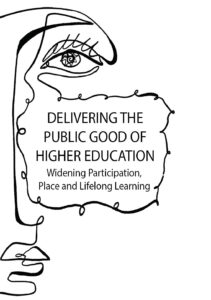So excited for this publication, thanks to the editing team for pulling this publication together despite the pandemic. Here is a short extract to be found at: https://drive.google.com/file/d/1LebIznHs5AekPU6dnuwZaemCB9j3hpQ1/view
What can critical thinking do for access to higher education adult learners at
a further education art institution? Reflections on a poetry group
Frances Norton (frances.norton@leeds-art.ac.uk)
Leeds Arts University, UK
Introduction
Although art students would prefer to make and create with their hands rather than write using thinking skills (Somerson and Hermano, 2013), nevertheless using a poetry group as a pedagogic intervention could help participants become more motivated to write because Lipman (2010) states when students engage in dialogue and collaboration they also participate in critical, caring and creative thinking. The purpose of this research is to discuss the importance of criticality and independent thinking for lifelong and WP students, and to outline a small experimental critical thinking (CT) intervention of a poetry group. The author’s interest in FE and lifelong learners began when writing a paper on curriculum design for the SUNCETT Research Development Fellow programme. Her interest in CT was ignited when reading Elder and Paul (2018) who believe much of thinking left to itself can be biased, distorted, partial, uninformed or prejudiced. They have developed a framework they call the Elements of Thought, to be discussed later. This current research into CT is likely to be of interest to teaching practitioner-researchers who may want to meaningfully enhance the experience of their students in developing thinking that is creative, caring and critical (Lipman, 2010). The question at issue is whether a poetry group may benefit some students in developing CT skills. The implications of increasing criticality for lifelong learners and WP adults is that it has the possibility of generating social mobility, social cohesion and cultural capital through a community of inquiry (CoI) built on trust and support.
The concepts of two key educational philosophers underpin the research and activities in this chapter: Brown (1998) has written of the importance of informal learning spaces; Lipman (2010) conceptualises cooperation and dialogue as a way of embodying CT. This chapter illustrates what happens when the author put educational theory into practice in the poetry group, and makes inference and interpretation based on datasets collected. Widening Participation (WP) adult learners and participants Matuta and Janus (anonymised names) talk about doubts they had at the beginning of the intervention in their focus group video:
"it’s not something I’d ever contemplated doing at all, but I thought
I’m going to college so it’s in for a penny in for a pound, I’ll give it
a go and actually I love it in a way I never believed that I would. I
really enjoy it...it’s more of a challenge. I thought, I can’t do this...I
thought it was going to be daunting." (participant Janus)
Research demonstrates how participants moved from self-doubt and apprehension, to a less tentative and more confident, assured way of expressing themselves. Findings indicate that using a CoI to investigate CT accesses the legacy of the critical traditions. Participants have become more articulate, dialogic and discursive in the group, which has in turn had an impact on their written course work.




Comments
Post a Comment